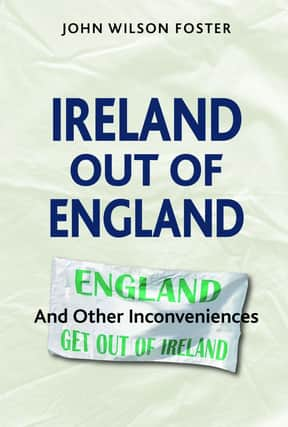John Wilson Foster: Let’s suspend the Irish unity campaign for now and focus on making Northern Ireland work


Do we need a Museum of the Troubles? Why do Canadian women wear redface? What does de-colonising the Ulster museums mean? What connects Mexico and QUB? Why, really, was the South so opposed to Brexit?
Yet the topical allsorts connect to the main theme of the book. Most of the essays are responses to the post-Brexit campaign by activists North and South to win a border poll and thereby Irish unification.
Advertisement
Hide AdAdvertisement
Hide AdAspiration to unity is perfectly legitimate. But to act only out of ideology, believing for example that a unified Ireland (mandating removal of Northern Ireland from the UK) is inevitable yet must be sleeplessly striven for, is to be oblivious to the personal, to difference of opinion, to the reality of experience.
Hence my subtitle ‘And Other Inconveniencies’: inconvenient truths concealed by the unity campaign – the most glaring gives my book its ironic title. In the light of the mantra ‘England Get Out of Ireland’, I trust readers will be as astonished as I was to discover that almost the entire body of gifted artistic and professional Southern Irish lives in England and that London is Ireland’s cultural capital. Not to speak of every sixth person born in the Republic living in Britain from which Northern Ireland is to be sundered while that sixth migrant happily stays put in the country of the ancient enemy. Go figure.
The essays led me to the conclusion that Northern Ireland is a proxy issue for the Republic. By solving it through unification, Southern activists hope to solve the unacknowledged real issue: the GB-Republic relationship. But the Northern Ireland problem can’t be solved until the Republic completes the unfinished business of its growing intimacies with Great Britain. The mis-named ‘Diaspora’ in Britain should break its silence and explain for us the irreplaceable value of those intimacies.
Nor has the South considered the multiple challenges to its society that a real debate on unity would entail, never mind actual unification.
Advertisement
Hide AdAdvertisement
Hide AdIn ‘A Debate on Irish Unity?’ I propose some seriously inconvenient items for the agenda. Against these inconvenient realities, activist nationalism hastens intrusive measures to speed the day to ‘get the North’ (as WB Yeats in 1925 described the project), from provocative imposition of the Irish language in the public sphere in the North (‘Beachheads and Wool') to ‘Ireland’s Belt & Road Initiative’ in the South.
The essays are printed in the order of their writing, with Northern Ireland their early focus. One of their concerns is with unionists who without losing their belief in their UK citizenship have withdrawn from public life, hence weakening the Union (‘God’s Away on Business’).
Unionists’ silence dates from the 1970s, understandably ‘encouraged’ by a vicious terror campaign, but has survived into the peace.
It stretches from the gentry through business to the professionals (‘Bellwethers or Allweathers?’) while nationalism has become more vocal and emboldened.
Advertisement
Hide AdAdvertisement
Hide AdBut the essays detect something else afoot. Recently and rapidly our own politics are becoming involved in the culture wars that now define GB and the rest of the English-speaking world.
Race, gender, immigration and in North America (where I now live) decolonisation and indigenisation - these issues and projects are deeply dividing our societies.
As they were written, my essays had to widen their concern in response, thus ‘Your Tribe or Mine?’ and ‘Pretendians’.
And these critical disruptions are coming to the South, late but in earnest. The South is now receiving the first wave: popular rejection of a top-down woke agenda concerning mass immigration and gender ideology, and a widening gap between the politicians and the people.
Advertisement
Hide AdAdvertisement
Hide AdAll these will, I believe, make the issue of a united Ireland come to seem like a burdensome distraction.
The cohesion of Southern society on which the united Ireland campaign (which has never been about diversity) is founded, is under tremendous early stress. (‘A Debate on Irish Unity?’)
Add to this the geopolitical unrest beyond the English-speaking world. Note the sudden anxiety in the UK and beyond about the South’s security and defence negligence and its problematic policy of neutrality while being internationally partisan.
The impingement of the October 7 massacre and the tragic aftermath has had its effect in the Republic in a way that distinguishes it from Northern Ireland, which is not predominantly anti-Israel.
Advertisement
Hide AdAdvertisement
Hide AdThe Republic, like the rest of us, will have more to think about than a united Ireland. Trying hard to reach that mirage would be a further and risky destabilisation not just of the island but of the archipelago and even Europe.
My book recommends suspending the unity campaign; letting Ireland re-set its relationship with Great Britain; and making Northern Ireland work before in calmer days ahead thinking about constitutional change.
John Wilson Foster, senior research fellow at the School of History, Anthropology, Politics and Philosophy at Queen's University Belfast
Ireland Out of England and Other Inconveniences is available by Belcouver Press. £10.99 from Colourpoint Books, Amazon, bookshops. £5.99 from Amazon Kindle.